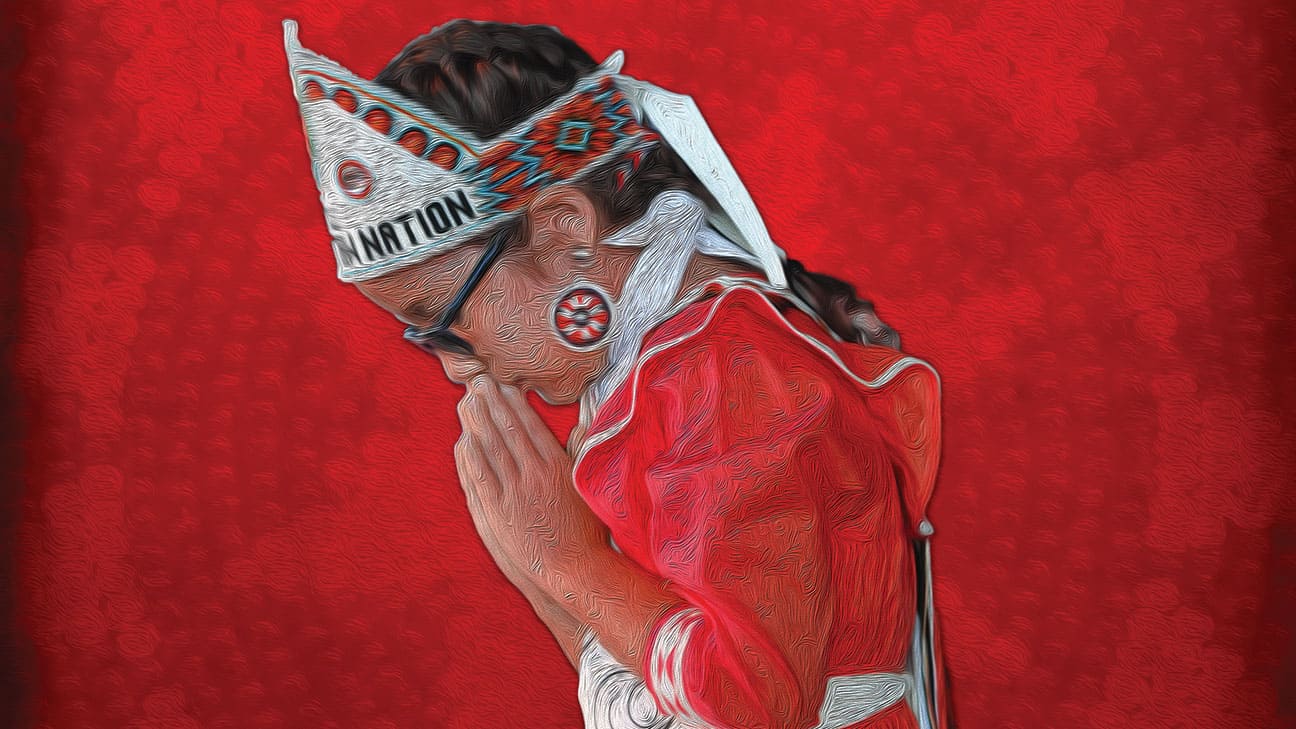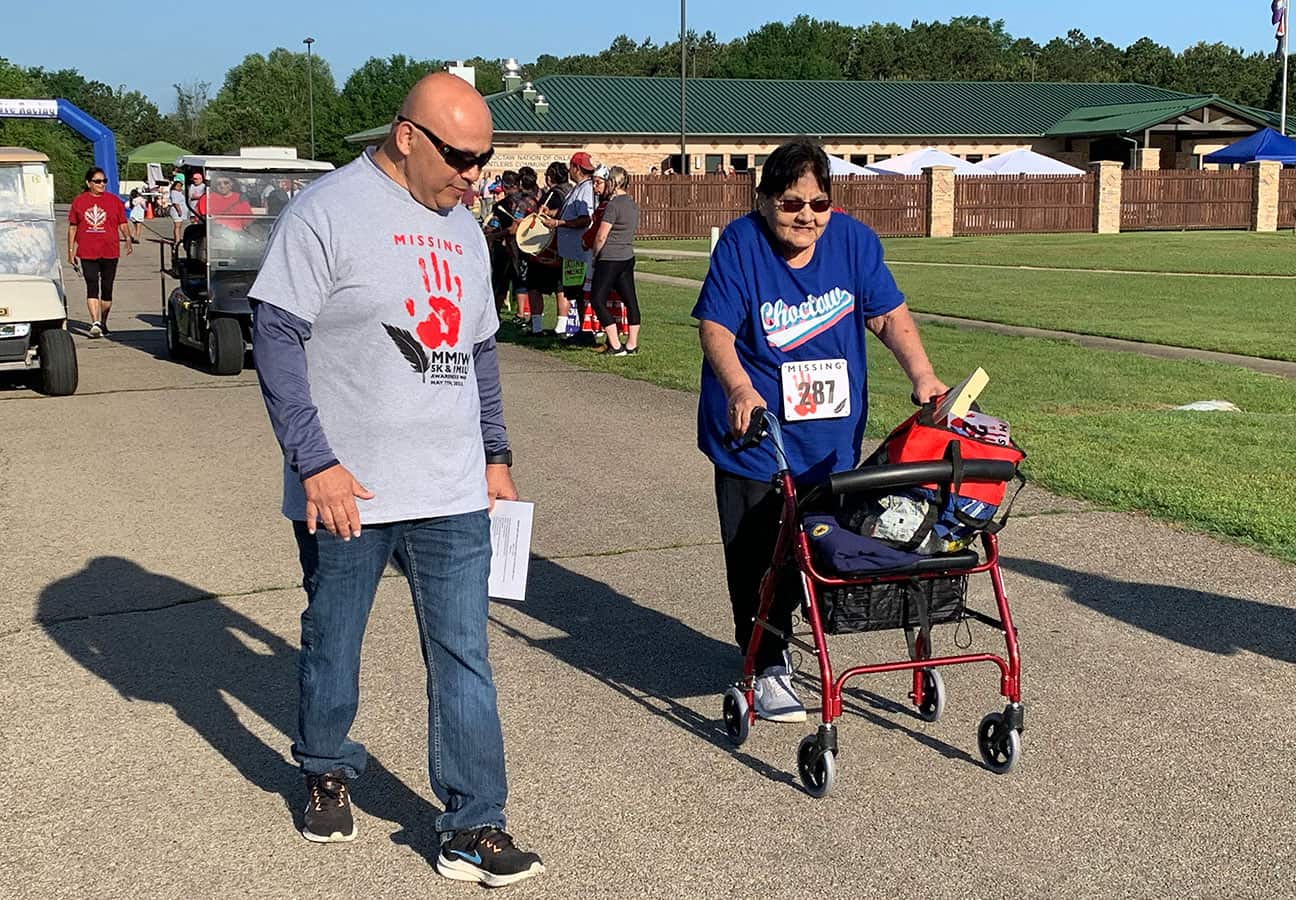
A Missing and Murdered Indigenous Women and Girls Movement Update
Published June 1, 2022By Kendra Germany-Wall
On May 7, 2022, supporters gathered at the Choctaw Community Center in Antlers, Oklahoma, to walk in honor of the Missing and Murdered Indigenous Women and Girls (MMIW/MMIWG) movement.
A total of 198 5K runners and 146 1 mile walkers took part in the MMIW Awareness Walk and Community Event. More than 500 people attended the event overall.
“We had racers ranging from the ages of 5 to 80; and those who traveled from Dallas, Texas and Bentonville, Arkansas to compete. The fastest race of the day was 22 minutes, 28 seconds by a 45-year-old gentleman from Bentonville, Arkansas,” said Tasha Mitchell, Director of Choctaw Nation’s Project EMPOWER.
Youth stickball players and Choctaw drummers were at the starting line, giving participants a rhythmic send-off.
MMIW statistics lined the route, reminding runners why they were running, and 18 programs were in attendance to share resources. The event was a success according to Mitchell.
During the month of May, events like this happened across the country, in hopes of bringing awareness to the crisis in Indian Country.
According to the Centers for Disease Control and Prevention, murder is the third leading cause of death for Indigenous women. A National Institute of Justice report in 2016 found that nearly 85% of Indigenous women have experienced violence in their lifetime.
In recent years, the topic of MMIWG has been thrust into the spotlight by activists, demanding change and awareness for their missing and murdered Indigenous sisters.
Below is a brief timeline of national events regarding MMIWG awareness efforts within the U.S. government.
May 5, 2019, a White House proclamation officially designated May 5 as the National Day of Awareness for Missing and Murdered Native Women and Girls.
Nov. 26, 2019, Executive Order 13898, Operation Lady Justice, created a task force for missing and murdered AI/ AN peoples that will address the concerns of Indigenous communities in the U.S., such as data collection, policies and establishing cold-case teams and improving investigative responses.
Oct. 10, 2020, Savanna’s Act became law, requiring the Department of Justice to review, revise and develop policies and protocols to address Missing and Murdered Indigenous Persons (MMIP) cases.
Also, on Oct. 10, 2020, The Not Invisible Act of 2019 was signed into law as the first bill in history to be introduced and passed by four U.S. congressional members enrolled in their respective federally recognized Tribes, led by Secretary of the Interior Deb Haaland during her time in Congress.
Apr. 1, 2021, Secretary Haaland announced the formation of a new Missing & Murdered Unit (MMU) within the Bureau of Indian Affairs Office of Justice Services (BIA-OJS) to provide leadership and direction for cross-departmental and interagency work involving missing and murdered American Indians and Alaska Natives.
“Violence against Indigenous peoples is a crisis that has been underfunded for decades. Far too often, murders and missing persons cases in Indian country go unsolved and unaddressed, leaving families and communities devastated,” said Secretary Haaland. “The new MMU unit will provide the resources and leadership to prioritize these cases and coordinate resources to hold people accountable, keep our communities safe and provide closure for families.”

At the time of the announcement, approximately 1,500 American Indian and Alaska Native missing persons had been entered into the National Crime Information Center throughout the U.S. and about 2,700 cases of murder and nonnegligent homicide offenses had been reported to the Federal Government’s Uniform Crime Reporting Program.
Investigations often remain unsolved due to a lack of investigative resources available to identify new information from witness testimony, re-examine new or retained material evidence and review fresh activities of suspects. The MMU will work with Tribal, BIA and FBI Investigators on active Missing and Murdered investigations.
The MMU will also enable the department to expand its collaborative efforts with other agencies, such as working to enhance the DOJ’s National Missing and Unidentified Persons System (NamUs) and developing strategic partnerships with additional stakeholders such as the FBI’s Behavioral Analysis Units, the FBI Forensic Laboratory, the US Marshals Missing Child Unit and the National Center for Missing and Exploited Children.
“We are fully committed to assisting Tribal communities with these investigations and the MMU will leverage every resource available to be a force-multiplier in preventing these cases from becoming cold case investigations,” said Secretary Haaland.
March 15, 2022, President Joe Biden signed the Violence Against Women Act Reauthorization Act of 2022. This law expands the special criminal jurisdiction of Tribal courts to cover non-Native perpetrators of sexual assault, child abuse, stalking, sex trafficking and assaults on Tribal law enforcement officers on Tribal lands.
On April 30, 2022, Oklahoma recognized Missing Murdered Indigenous Women–Chahta as a charitable foundation. The group was co-founded by Karrisa Hodge and Christa Lampkin, employees of the Choctaw Nation of Oklahoma (CNO).
“I wanted to start this organization because there wasn’t one that covered our area. I was vice-chair of another MMIW chapter and was picking up these cases. God lead me to start our own chapter here. While doing so, we wanted to do something a little more for the families. We wanted to incorporate healing events for them. These will happen four times a year, going around the seasons,” said Hodge.
The first healing event will be held in June.
The group will also hold educational classes for tribal members and the community on domestic violence, human trafficking, healthy relationships and addiction.
“Our primary goal is to support MMIW families during the tragedy and after,” said Hodge. “We also want to bring awareness to the community and educate them in different areas to do preventive maintenance to help reduce the number of our Women getting murdered or joining abusive relationships.”
According to Hodge, she has learned a lot during this process.
“The most rewarding part about this journey is seeing our elders’ faces and having mothers who have lost their daughters reach out when hearing about this chapter. You can see the pride in their eyes, knowing their loved ones have not been forgotten and we are here to serve our people,” Hodge said. “We just want to show love and support and promote healing for our Native people in general.”
For more information, visit the Missing Murdered Indigenous Women-Chahta Facebook page.
May 5, 2022, President Biden released a proclamation on Missing or Murdered Indigenous Persons Awareness Day 2022. Also on this day, Secretary Haaland and Deputy Attorney General Lisa Monaco recognized National Missing or Murdered Indigenous Persons Awareness Day with a virtual event, highlighting the Not Invisible Act Commission. During the event, the names of commission members were announced.
The Departments of the Interior and Justice are working to implement the Not Invisible Act, sponsored by Secretary Haaland during her time in Congress. The law established the Not Invisible Act Commission, a cross-jurisdictional advisory committee composed of law enforcement, tribal leaders, federal partners, service providers, family members of missing and murdered individuals and most importantly — survivors.
“Everyone deserves to feel safe in their community, but a lack of urgency, transparency and coordination have hampered our country’s efforts to combat violence against American Indians and Alaska Natives,” said Secretary Haaland. “As we work with the Department of Justice to prioritize the national crisis of missing and murdered Indigenous peoples, the Not Invisible Act Commission will help address its underlying roots by ensuring the voices of those impacted by violence against Native people are included in our quest to implement solutions.”
“The Justice Department is committed to addressing the crisis of missing or murdered Indigenous persons with the urgency it demands,” said Attorney General Merrick B. Garland. “That commitment is reflected in the strength of our partnerships across the federal government, including with the Department of the Interior as we take the next steps in launching the Not Invisible Act Commission. The Commissioners announced today will play a critical role in our efforts to better meet the public safety needs of Native communities. The Justice Department will continue to work alongside our Tribal partners with respect, sincerity and a shared interest in the wellbeing of Tribal communities.”
The Not Invisible Act Commission will make recommendations to the Departments of the Interior and Justice to improve intergovernmental coordination and establish best practices for law enforcement, as well as bolster resources for survivors and victims’ families and combat the epidemic of missing persons, murder and trafficking of Indigenous people.
According to its mission, the Commission will:
- Identify, report and respond to instances of missing and murdered Indigenous peoples (MMIP) cases and human trafficking.
- Develop legislative and administrative changes necessary to use federal programs, properties and resources to combat the crisis.
- Track and report data on MMIP and human trafficking cases.
- Consider issues related to the hiring and retention of law enforcement offices.
- Coordinate tribal-state-federal resources to combat MMIP and human trafficking offices on Indian lands.
- Increase information sharing with tribal governments on violent crimes investigations and other prosecutions on Indian lands.
For more information and a list of commission members, visit the Not Invisible Act Commission webpage.

CNO offers several services to those affected by domestic violence and abuse.
The Tribal Victim Assistance Program provides comprehensive services to Native American victims of crime, including emergency food, clothing, shelter, safety plans, goal planning, courtroom advocacy (support) and other emergency services to restore the victims’ sense of dignity and self-esteem.
Tribal Victim Services guides victims of crime and their families with counseling and group therapy. This program consists of a Victim Advocate and a Licensed Professional Counselor (LPC) who provide comprehensive, culturally competent, direct services to victims of crime and their families.
Project EMPOWER assists victims of domestic violence, dating violence, sexual assault and stalking by helping them stabilize housing, childcare and other day-to-day support so they can focus on reclaiming their lives.
For more information about the CNO programs mentioned above, call 877-285-6893.
Family Violence Prevention provides quality specialized services and resources that promote family strengths and stability and enhance the safety of victims of domestic violence, family violence or dating violence and their dependents.
Choctaw Children and Family Services is ready to help anyone experiencing domestic violence. If you or someone you know is a victim of family violence or you’re living in fear of violence, call 800-522-6170.
Other useful contacts include:
- Oklahoma Safeline – 800-522-7233 (SAFE)
- National Domestic Violence Hotline – 800-799-7233 (SAFE)
- Rape, Abuse & Incest National Network Hotline – 800-656-4673 (HOPE)
- Communication Services for the Deaf – 800-252-1017 (TTY) / 866-845-7445 (Voice)
- Okla Coalition Against Domestic Violence & Sexual Assault (Monday-Friday, 9 a.m.- 5 p.m.) – 405-524-0770
- Stronghearts Helpline – 844-762-8483 (1-844-7NATIVE)
Even though all of the progress is a step in the right direction for activists and families, there is still much left to do to address this issue correctly.
The National Indigenous Women’s Resource Center offers resources and ways to get involved in the MMIW movement and information on other Indigenous Women’s Issues.
Visit www.niwrc.org for more information.